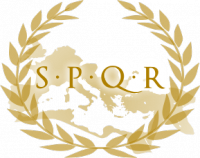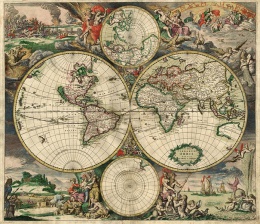Historical boylove relationships in ancient Rome
From BoyWiki

In ancient Rome, there were many known pederastic relationships between adult men and adolescent boys. In some of these cases both members became well-known historical figures, while in others, only one of the two may have. In the following list, the couples are listed in chronological order, and the name of the older partner precedes that of the younger. Though many more men are known to have engaged in such relationships, only those instances in which the name of the younger partner is known are included.
Ancient Rome
| Part of the boylove history series |
 |
| Portal:History |
Roman Republic - (509 BC–27 BC)
- Lucius Quinctius T.f. Flaminius and Philip
- While consul in 189 BCE, Flaminius took the Carthaginian boy as catamite on his travels away from Rome, only to be berated by the youth for making him miss the gladiator games. At dinner one day, a Gaul presented himself to ask for safety. The consul asked the boy if he wanted to see a man killed, and ran the Gaul through with his sword.[1]
- Gaius Lucilius and Gentius (and Macedo)
- In his poetry, Lucilius blames a praetor for having stolen Gentius from him, and predicts the boy will return. The satirist was blamed in later antiquity for having "prostituted" his lovers by using their actual names in his poem, instead of veiling them, as other authors were wont to do, by the use of pseudonyms.[2][3][4]
Historical boylove relationships in ancient Rome
Western Roman Empire - (27 BC–476 AD)
- Octavian and Sarmentus
- One of the favorites (or, "delicia") of the emperor, Sarmentus was held up as an example of rank favoritism by the historian Dellius. He incurred Cleopatra's wrath by complaining that while he and others dignitaries were served sour wine by Marc Antony in Greece, Octavian's catamite was drinking Falernian in Rome.[5]
- Virgil and Alexander
- According to an account by Suetonius preserved in the writings of Aelius Donatus, itself incorporated in a critical account by Servius, the Alexis of the Bucolics was based on a real-life beloved of Virgil. Allegedly, Virgil was fond of boys, with later commentary specifying that his love was patterned along the lines of chaste pederasty. The boy, a slave, was a gift from one of his patrons, Asinius Pollio.[6] While some modern historians accept the story as credible, an opposing school of thought deems it a fabrication.[7]
- Nero and Sporus
- According to Suetonius, "He castrated the boy Sporus and actually tried to make a woman of him; and he married him with all the usual ceremonies, including a dowry and a bridal veil, took him to his home attended by a great throng, and treated him as his wife. [...] This Sporus, decked out with the finery of the empresses and riding in a litter, he took with him to the courts and marts of Greece, and later at Rome through the Street of the Images, fondly kissing him from time to time."[8]
- Vitellius and Asiaticus
- First slave and catamite of Vitellus, the boy ran away, was found, imprisoned, reinstated in his former position, sold as gladiator, recovered again, freed and finally knighted by his lover on his first day as emperor in 69 CE, to whom he became a trusted adviser for the short duration of his reign.[9]
- Martial and Diadoumenos
- Aulus Pudens and Encolpus
- Domitian and Earinos
- Trajan and Arbandes
- Trajan's love of youths influenced even his governing, leading him, around 115 CE, to favour the king of Osroene out of appreciation for his handsome son: "On this occasion, however, Abgarus, induced partly by the persuasions of his son Arbandes, who was handsome and in the pride of youth and therefore in favor with Trajan, and partly by his fear of the latter's presence, he met him on the road, made his apologies and obtained pardon, for he had a powerful intercessor in the boy."[18]
- Emperor Hadrian and Antinous
- The Roman emperor met this 13 or 14 years old boy from Bithynia in 124 CE. Antinous was deified by Hadrian, when he died six years later. Many statues, busts, coins and reliefs display Hadrian's deep affections for him: http://antinoos.info/antinous.htm
- Herodes Atticus and Polydeukion
- Herodes emulated Hadrian in establishing a heroic cult for the boy upon his early death ca. 174 CE.[19]
Eastern Roman Empire - (330–1453)
- Ptolemy and Eutropius
- Eutropius, an Armenian or Assyrian slave castrated at birth, was derided for having had many masters, beginning with Ptolemy, a groom or soldier in the imperial stables of Byzantium. Promised his freedom by his master, he was instead given as a gift (being still too young to be bought) to the general Arintheus, whom he served as pander.[20][21]
References
- ↑ Livy, The History of Rome XLII
- ↑ Amy Richlin, The Garden of Priapus: Sexuality and Aggression in Roman Humor p. 165
- ↑ Lucilius, 273, 274
- ↑ Apuleius, Defense 10
- ↑ Plutarch, Life of Marc Antony; 59
- ↑ Aelius Donatus, Life of Virgil; tr. David Wilson-Okamura (1996; rev. 2005); 9-11 [4] "With regard to pleasure, he was partial to boys. <But good men have thought that he loved boys as Socrates loved Alcibiades, and Plato his favorites ( paidiká).> He loved Cebes and Alexander most of all. Alexander was a gift to him from Asinius Pollio; the second poem of his Bucolics refers to him as "Alexis." Nor was the other one unlearned; in fact, Cebes was a poet as well."
- ↑ Richard Jenkyns, Virgil's Experience: Nature and History, Times, Names, and Places p.7; Oxford University Press, 1998
- ↑ Suetonius, The Lives of Twelve Caesars, Life of Nero 28
- ↑ Suetonius, The Twelve Caesars IX.12
- ↑ Craig Williams, Roman Homosexuality: Ideologies of Masculinity in Classical Antiquity, p.33
- ↑ Martial, Epigrams, III.65; V.46; VI.34
- ↑ Craig Williams, Roman Homosexuality: Ideologies of Masculinity in Classical Antiquity, p.33
- ↑ Martial, Epigrams, I.31; V.48
- ↑ Craig Williams, Roman Homosexuality: Ideologies of Masculinity in Classical Antiquity, p.33
- ↑ Statius, Silvae, IV 3. Translation is from Publius Papinius Statius, Silvae IV, edited with an English translation and commentary by K.M. Coleman, New York: Oxford University Press, 1988. Latin: "... fortem vetat interire sexum et censor prohibet mares adultos pulchrae supplicium timere formae."
- ↑ Dio Cassius, LXVII 2.3.
- ↑ Martial, Epigrams, IX.16, 17, 36
- ↑ Dio Cassius, Epitome of Book LXVIII; 21.2–3
- ↑ Giovanni Dall'Orto,Saggi di storia gay > Biografie di personaggi gay > Erode àttico "Erode Attico ebbe amori omosessuali che non si preoccupò di rendere pubblici. Quello che fece più parlare di sé fu l'ultimo, perché quando ad Atene l'adolescente "discepolo" Pollùce (Polydeukes / Polydeukion / Polideuce)"[5]
- ↑ Claudian, Against Eutropius Loeb edition p.143-145
- ↑ Edward Gibbon The Decline and Fall of the Roman Empire: p.325N7; Published 1899 P. F. Collier & Son, 1899
